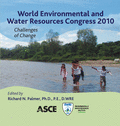Does Study of "Economy & Risk" Alter Engineers' Views of Sustainability Issues?
Publication: World Environmental and Water Resources Congress 2010: Challenges of Change
Abstract
This paper describes the results of a two year assessment of whether engineering students modify their perspectives on "sustainability" because of exposure to topics of real economics and risk in their coursework. In conjunction with Villanova University's "Year of Sustainability", implied and explicit considerations of "sustainability" issues were introduced into our "Economy & Risk" course. An evaluation of resulting effects on students' awareness of and perspectives on issues of sustainability was attempted. For example, on day one of the class, students were asked to write a short meaning of sustainability. Examples of the many and varied one-word answers ranged from "long-term" (33% ) to "no idea" (10%). Comparison of word association studies reported for environmental science students with the results from CEE students revealed interesting differences. The environmental science department surveys (Sherman, 2008) reported that the most commonly associated words were mainly prescribed practices (recycling, composting, etc. [90%]); only 5% responded with a "bigger idea", such as "systems" or "balance" and 5% picked environmental problems (global warming, biodiversity). Only 14% of the CEE students identified "sustainability" with prescribed practices; 18% chose environmental problems; while 56% of the responses were "long-term" or similar words. The remaining 12% were either non-responsive or admitted "no idea" [4%]. These engineering students clearly had a much different "view of sustainability" than did the environmental science students. The CEE students were also required to critique Solow's paper describing an economist's view of sustainability (Solow, 1991) intended to expand their perspectives on such issues. Finally, these students were given an essay question on the final exam that asked them to explain how this course had influenced their respective understanding of sustainability. They claimed that they had learned that "sustainability" was a vague term and that it involved not so much preserving particular resources but rather the capability (including the roles of technology and knowledge) for future generations to succeed. Most students had clearly expanded their respective understanding of the questions surrounding sustainability and the engineering role. However, a number said they hadn't changed their opinion about the need for activities commonly labeled sustainable. The assigned work of 114 students enrolled in two consecutive offerings of the course (Fall 2008, Fall 2009) was used to address two major questions. The first question was whether the content of the course had been effective with respect to promoting sustainability knowledge. The second was to assess whether it had "influenced" students' thoughts about sustainability issues. Results did not differ significantly between the two classes.
Get full access to this chapter
View all available purchase options and get full access to this chapter.
Information & Authors
Information
Published In
Copyright
© 2010 American Society of Civil Engineers.
History
Published online: Apr 26, 2012
Authors
Metrics & Citations
Metrics
Citations
Download citation
If you have the appropriate software installed, you can download article citation data to the citation manager of your choice. Simply select your manager software from the list below and click Download.
